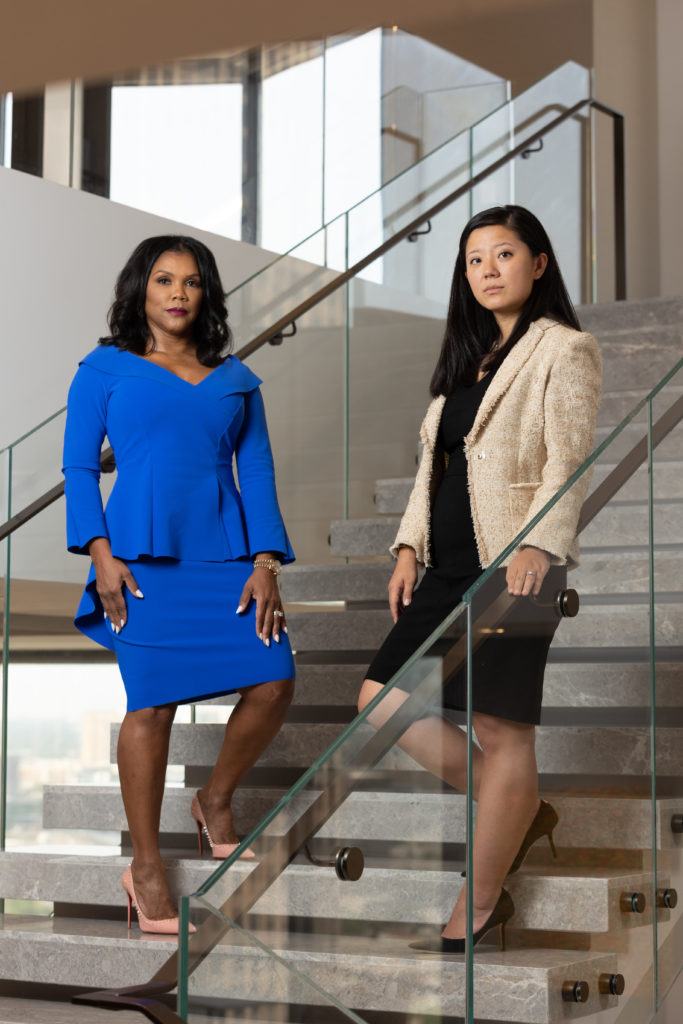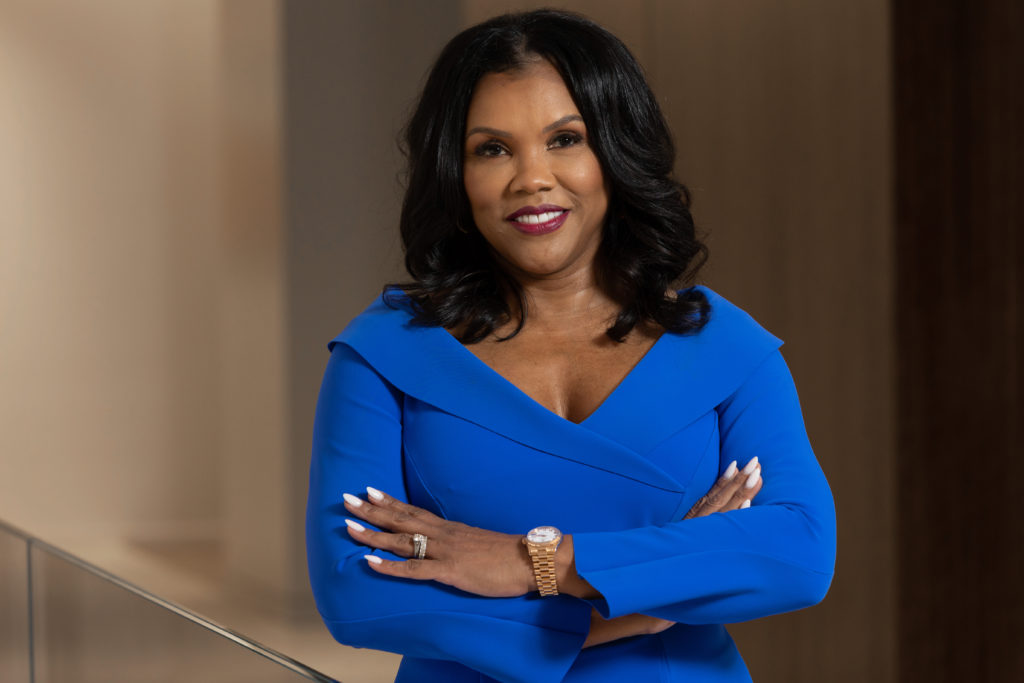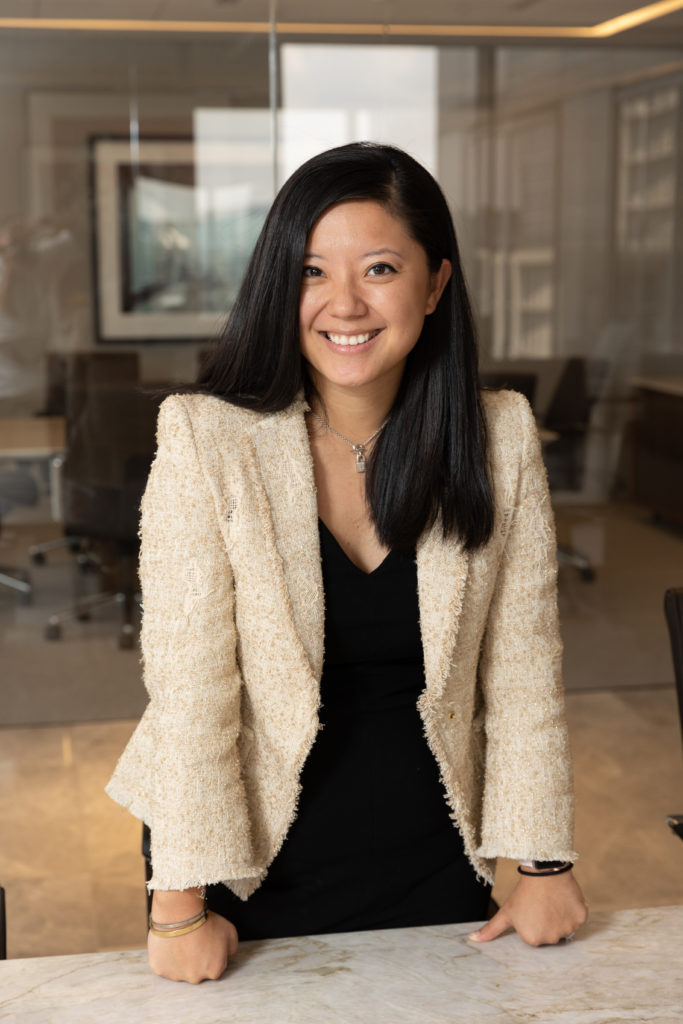
Veronica Lewis Moyé and Betty Yang
One of the biggest antitrust cases since United States v. Microsoft two decades ago involves the world’s largest corporation by revenue and has a distinct Texas accent.
The May 2021 Epic Games v. Apple trial, dubbed the “Super Bowl” of antitrust cases, had two women lawyers from Dallas as critical members on Apple’s trial team. Gibson Dunn partner Veronica Moyé and of counsel Betty Yang, two diverse women lawyers, were not hired by Apple to just bring an appearance of a diverse legal team; they played crucial and leading roles during the three-week bench trial in Northern California federal court.
Co-piloting with another woman lawyer, Paul Weiss partner Karen Dunn, Moyé was one of Apple’s lead lawyers for the trial. Moyé handled a significant portion of closing arguments; she direct examined Apple Chief Executive Tim Cook and Trystan Kosmynka, another key Apple witness; and she cross-examined one of Epic’s key experts (which someone on Twitter described as “an evisceration”). Yang played a significant role in preparing witnesses for their testimony (she was the brains behind Cook’s testimony, Moyé said), argued motions for Apple and was at the epicenter of all other major moving parts of the complex trial.
“I had never been to trial with another woman before this case,” Moyé, who is African American, told The Texas Lawbook.“There is very little diversity in this sphere of practice, and on our team the people who appeared in court for Apple included two white males, one white woman, one Indian American, one Chinese American and me. I haven’t been on this diverse of a team before. There were probably more women than men working on the case.
“The team I was working with for closings was all women,” Moyé added. “It was a really special experience. It’s the beginning of a bright new future … other women will have. It’s going to be so much better than the world I came up in.”
Two other women on the team were Apple’s own lawyers: Apple General Counsel Kate Adams and Heather Grenier, head of Apple’s commercial litigation.
Epic also had a diverse team. The company’s lead lawyers were Cravath, Swaine & Moore partners Katherine Forrest (a former federal judge in New York) and Gary Bornstein, an LGBTQ lawyer.
“I’ve tried a lot of cases and have never seen so much diversity on trial teams,” U.S. District Judge Yvonne Gonzalez Rogers, who presides over the case, told lawyers on both sides at the end of trial. “I wanted to congratulate you and thank the clients as well for really focusing on those issues as important. These are important issues. They affect lots of people, and it’s really terrific to see so much diversity in the courtroom.”

“There are not many antitrust cases that my 14-year-old nephew is interested in.”
— Veronica Lewis Moyé
Photo: Nathan Hunsinger
Beyond the legal team diversity in a historically non-diverse area of the law, the case is notable for a few other reasons: It involves the most important antitrust case in recent history and one of the world’s most popular video games. As a bonus, the case also featured Cook’s first-ever courtroom testimony and — against the grain for the extremely technical world of antitrust law — attracted an unusually high volume of public interest. At one point, teenaged spectators were feuding with each other on the public line.
That’s because Apple and Epic are fighting over potentially business model-changing issues involving Apple’s App Store — specifically, with respect to Epic’s Fortnite video game, which German market and consumer data company Statista estimated had 350 million registered users as of May 2020. Epic sued Apple in August 2020 after Apple removed Fortnite from the App Store, allegedly in retaliation to Epic challenging Apple’s “anticompetitive rules” when Epic, through Apple’s App Store, offered a competing payment processor for in-app purchases, court documents say.
“At the outset, kids who were Fortnite supporters got into a fight on the public access line with kids who were Apple supporters,” Moyé said of one of her favorite moments of the trial. “There are not many antitrust cases that my 14-year-old nephew is interested in.”
Epic claims Apple is a monopoly because of the exclusive control it has over its App Store and payment processing for in-app purchases, which also requires app developers to pay Apple a 30% commission. Apple argues that the competing payment processor that Epic installed for Fortnite breached Epic’s contract with Apple, that it risks the privacy and security of iPhone users and, if anything, that the current business model of the App Store is procompetitive, not anticompetitive.
The case is now in the hands of Gonzalez Rogers, an Obama-nominated federal jurist and University of Texas law graduate who is originally from Houston and is the Northern District of California’s first Latina district judge. Though lawyers involved say there’s no real clarity on when Judge Gonzalez Rogers will issue her ruling, it could be in the coming weeks.
Both Moyé and Yang have seen their fair share of high-stakes antitrust and other complex commercial cases in their careers. A recent win in Moyé’s 35-year legal career include defeating class action certification on behalf of BNSF Railway in a price-fixing conspiracy case in Washington, D.C., federal court that had more than $30 billion in damages at stake. She recently achieved the same result for Tenet Healthcare in the Western District of Texas when a group of nurses alleged an antitrust conspiracy to suppress their wages. A 2009 graduate from Duke University School of Law, Yang worked on litigation related to the BP oil spill, and more recently, received news in the middle of the Epic-Apple trial of a win for a pharmaceutical company she represented in a qui tam False Claims Act case brought by a generic competitor.

“The issues were so important that I felt very lucky to even get to be in the room.”
— Betty X. Yang
Photo: Nathan Hunsinger
And neither Moyé nor Yang were strangers to representing Apple. With others at Gibson Dunn, both lawyers are involved in a pair of consumer and developer class action cases on behalf of Apple, Pepper v. Apple and Cameron v. Apple, which began with the former in 2011 and has included a detour to the U.S. Supreme Court. Both are being litigated in Judge Gonzalez Rogers’ court.
But no complex antitrust matter or previous engagement for Apple could have prepared the company’s lawyers for the record speed in which the case against Epic went to trial. A nine-month turnaround for any complex commercial case can be unusual; for an antitrust dispute of this magnitude, it’s unheard of. Epic didn’t want damages; as Apple puts it, its courtroom opponent wanted the tech giant to change its business model with respect to the App Store.
“In a typical antitrust case, a rapid speed to get to trial would be two to three years,” Moyé said. “There hasn’t been a more significant antitrust challenge since U.S. v Microsoft, and arguably this is more significant than that. It’s incredible to be on such a cutting edge both in terms of technology and law.”
“This [case] was definitely a memorable one in which the issues were so important that I felt very lucky to even get to be in the room,” Yang said.
Moyé said she enjoys antitrust cases because of the “combination of intense facts and intense economics.
“It’s very rigorous and very academically challenging, on top of all normal litigation challenges,” she said.
The arguably most anticipated moment of trial was the testimony of Apple CEO Tim Cook, who took the witness stand live in a courtroom for the first time.
In any trial, preparing a chief executive of a large and closely scrutinized company is an intense and high-pressure task to complete. But Moyé, who said her favorite kind of work on cases is the direct and redirect-examination of witnesses, was up for the task.
“When you’re dealing with a senior executive, you have to realize that every word they say, the company will have to live with forever,” Moyé said. “[Direct-examination] requires you to really learn about and understand your client’s business in-depth as well as get to know your individual witness well personally. Direct is the chance for your client to finally tell their story, and it needs to be authentic to be persuasive. Redirect is a particular challenge because you have to make split second decisions on what you cover and how your witness is likely to respond to potentially new areas.”
Apple’s in-house lawyers were not available to comment for this story, but Dallas Gibson Dunn partner Rob Walters said it didn’t surprise him “in the least” that Apple chose Moyé to co-lead the trial.
“She’s clear as well water and highly credible,” said Walters, who has known Moyé for nearly three decades.
Plus, she’s “absolutely unflappable” even when under pressure, he said.
“She just doesn’t overextend; she exudes credibility,” Walters said. “The sooner a trial lawyer learns that, the better. Veronica is all that and more. Her skills of being able to theme an antitrust case are so unusual and so valuable.”
Although she was one of the youngest members on the Apple team, Walters said Yang was a major asset to the trial team because she brought a “tenaciousness” and “comprehensive mastery of the issues.” Moyé said Yang was “the most in-demand person on the team.”
“We’re proud to have them as partners and colleagues,” Walters said of Moyé and Yang. “It’s a great [time] for women in our profession.”
